#Gretchen McCulloch
Explore tagged Tumblr posts
Text
But there was a period of friction, when “hello” was spreading beyond its summoning origins to become a general-purpose greeting, and not everyone was a fan. I was reminded of this when watching a scene in the BBC television series Call the Midwife, set in the late 1950s and early 1960s, where a younger midwife greets an older one with a cheerful “Hello!” “When I was in training,” sniffs the older character, “we were always taught to say ‘good morning,’ ‘good afternoon,’ or ‘good evening.’ ‘Hello’ would not have been permitted.” To the younger character, “hello” has firmly crossed the line into a phatic greeting. But to the older character, or perhaps more accurately to her instructors as a young nurse, “hello” still retains an impertinent whiff of summoning. Etiquette books as late as the 1940s were still advising against “hello,” but in the mouth of a character from the 1960s, being anti-hello is intended to make her look like a fussbudget, especially playing for an audience of the future who’s forgotten that anyone ever objected to “hello.”
Because Internet, Gretchen McCulloch
13K notes
·
View notes
Note
You, the Mini genus and your tumblr were mentioned in the new Let's Learn Everything podcast episode by Gretchen McCullen! That was really sweet :)
I was so thrilled to hear about this, and then of course went and listened to the episode. Gretchen is just great, and that's a phenomenal episode. I learned a lot! I'm a big fan of the @Lingthusiasm podcast as well, and have been listening for years. Part of my Tolkein and Taxonomy obsession is a love of language and words (see also: my love of puns), and I often say that linguistics would have been my alternate career path, had I somehow not been able to pursue evolutionary biology and herpetology.
#Mini#taxonomy#Lingthusiasm#Let's Learn Everything#podcasts#Gretchen McCulloch#answers by Mark#myceliumromance#fucking ace handle there my friend
121 notes
·
View notes
Text
Every Tumblr user knows that we Tumblrinas use language a little differently. We're not like other social media users. We're weird. We're weirdos. And this month, we have actual linguist Gretchen McCulloch (@allthingslinguistic) on to talk about it!! Plus: House of the Dragon dragon-related feelings and throwing a ball in the air as you lay on your bed like a 90s teen character.
Credits and transcript in our reblog. You can find transcripts for this, and every other episode, here.
Find the posts discussed in this episode in this tag!
318 notes
·
View notes
Text

#because internet#gretchen mcculloch#nonfiction#book poll#have you read this book poll#polls#requested
58 notes
·
View notes
Text
Rayashki and Zeno: How a harsh environment shapes actions.
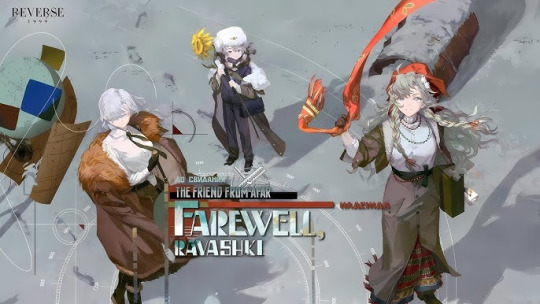
Sometimes, a perception is taken as a principle. A "cruel reality" can be described as a negative perception of the material world, used to assert a situation. "Reality is cruel", however consists in using the previously descrived perception as a fundamental truth or a proposition in which to base the foundations of a system of belief, of behaviour or of a chain of reason. Both are heavily present in Farewell Rayashki, a story all about the strenght of the colective, the indomitable human spirit in the face of adversity and what shapes the actions of those who persue a goal. With that in mind, I wanted to write... Not an analysis per se, but rather to build some sort of structure or perspective (whatever you want to call it) through which the story can be analyzed.
Now, imagine a matrix diagram where the X-axis goes from "Gemeinschaft" (Community) to "Gesellschaft" (Society), two terms taken from german sociologist, Ferdinand Tönnies, and the Y-axis goes from "Deontic" to "Epistemic" in a mix between a Gretchen McCulloch's linguistic sense and a Józef Maria Bocheński's philosophical sense. If everything I just said made no sense, don't worry. Here's a (very) rough explanation of what I'll mean with these two dichotomies through this post: X-axis: A classification of societal ties. "Gemeinschaft" refers to personal, direct interactions with emotional relationships (such as families or small towns like Rayashki) formed by people who strive to archive the goals of a collective. "Gesellschaft", on the other hand, is about indirect and formal interactions, with more rational relationships (like a company or an institution like Zeno) in which everyone band together to persue personal goals in common. Y-axis: A classification of actions as both modality (McCulloh) and authority (Bochenski). Roughly: "actions based on interpretations and beliefs done by someone with an authority based on their ammount of knowledge and experience" (Epistemic)" vs "actions based on rules and/or desires done by someone with a role or position that gives them the power to enforce them" (Deontic).
Upper-left: Gemeinschaft/Epistemic
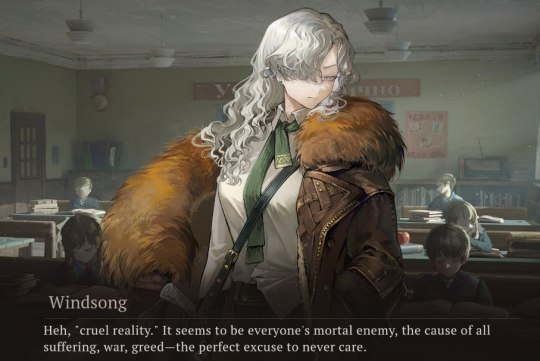
Windsong's quest, mostly percieved as a fool's errand, is a classic underdog story. The lone reasercher who, disheartened by the lack of support from all the important academic institutions and societies, finds in the small town of Rayashki a more hospitable enviroment to persue her goals. She creats emotional conections with the community and soon finds more self-fulfilment in helping the townfolk than in other things like taking Zeno's offer or abandoning her studies, which are presented as more beneficial options from a rational point of view.
She confronts the notion of "cruel reality" and rejects "Reality is Cruel" as a principle. This action comes from what she knows (her study of ley lines) and beliefs (the people of Rayashki, the usefullness of her field of research).
Bottom-Left: Gesellschaft/Epistemic
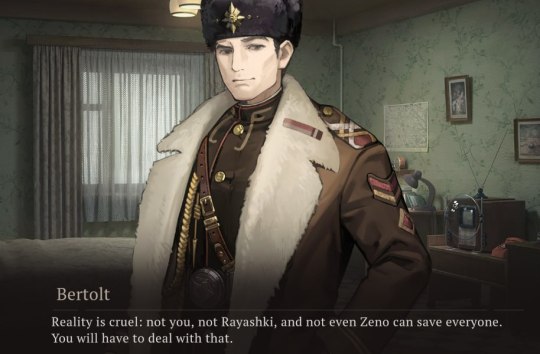
You'll think he should be at the opposite side of Windsong BUT Bertolt, as the classical evil guy in your everyday underdog story, actually rejects the notion of "cruel reality", and accepts "Reality is Cruel" as a principle. His emotional detachment from the people of Rayashki, their values, and even their very same idea of community, comes from his role as a member of Zeno, an institution that exemplfies the impersonal and formal relationships of the Gesellschaft. He doesn't see himself as the evil corporate guy who's there to destroy their dream for a greedy goal, but as the savior who comes to provide the light of rationality to this uncultured rural people who are willing to risk their lives for the sake of primitive traditions and values. He defines himself as a "simple representative of Zeno, bound by their rules and orders, working tirelessly to help people in a world wreaked by The Storm", a description that allows him to minimize his negative perception of the reality of others while justifying operating under the principle of Reality is Cruel.
Bottom-Right: Gesellschaft/Deontic
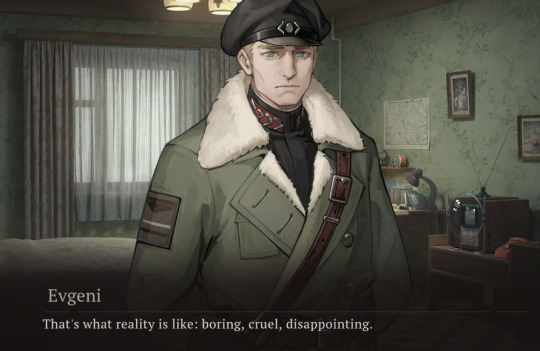
Evgeni is shown through the story as a leader of Rayashki who deeply cares about his community BUT is willing to destroy it for the sake of a rational goal: protecting the lives of the townfolk.
He embraces the notion of "cruel reality", and accepts "Reality is Cruel" as a principle.
But how is HE in the opposite side of Windsong, instead of Bertolt? In Tönnies dichotomy of Gesellschaft and Gemeinschaft, the relationships that are meant to keep people in communities and societies can also push them out: is all about wether the social ties become too tight or too lose to help us find self-fulfilment in them. Windsong found in a community what she couldn't find in society (validation and encouragment for her study of ley lines), while Evgeni thought he found in a society what he couldn't find in his community (a positive prospective for the people of Rayashki).
Upper-Right: Gemeinschaft/Deontic
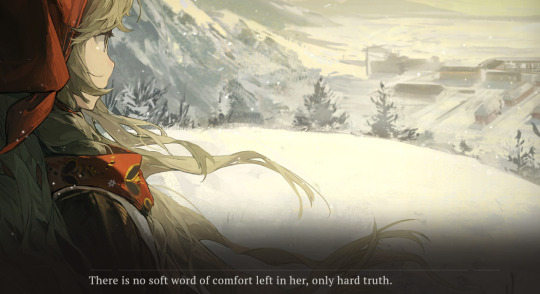
While Bertolt is a man of the world, trying to expand the benefits of globalization by placing the needs of bigger groups above those of the little ones, what Vila is persuing isn't just a goal to archive, but a dream to share. She didn't became a part of Rayashki only to build an utopia: everyone living there were already doing that and Vila found meaning in developing strong emotional ties with everyone as they strive together to work hard for Rayashki.
However, unlike Windsong, she accepts the notion of "cruel reality", even if she doesn't agree with "Reality is Cruel" as a principle. This one si a bit tricky to explain.
It all comes down to their experiences while chasing their dreams and how that shaped their understanding of what a dream is.

For Vila, is something that kept her going. A cherished wish that inspired her to leave the rusalki and search for a new home. A goal she could share with the people of Rayashki. A hope to cling unto while she nourishes the sprouts of Rayashki while they are passengers of the ship called "St Pavlov's Foundation" while adrift in the vast sea of the outside world, so they can carry on the spirit of Rayashki. She accepts the "cruel reality" as something that could hinder her dreams, force her to adapt them, but never crush them.
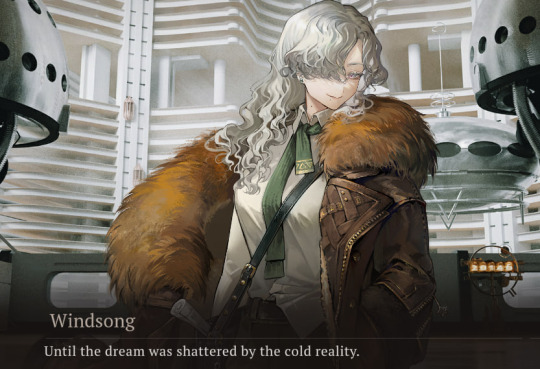
For Windsong, the dream was but a promise turned into a burden. It was not something that comforted her if held tight, but rather something it pained her to let go. Accepting the "cruel reality" meant letting something die, and for someone who was struggling in all fronts, it meant taking a toll way to big for her to handle.
As the last ley line hunter, the dream is but a gamble turned into an investment. The chance of failure is there no matter what. Only thing she can do, is to work hard to reduce it as much as possible. To her, a "cruel reality" is something that crushes dreams. Is not enough to reject the use of this perception as a principle: her own experiences taught her that the perception itself can be a cancer. She might have a tendency to put herself down, to have doubts on what she does and to even be "realistic" in any situation she encounters. But there's ALWAYS a part of her fighting her perception of reality from turning into a negative one even if she lacks the proper arguments or mental state to do it effectively. Vila noticed that from day one, and began to slowly share with her the tools Windsong lacked, helping her become a more confident and capable person, while inadvertibly gaining a trusty partner to rely on.
Their experiences shaped them into people who complement each other incredibly well. Leaning into each other, they'll plant their seeds of hope into a new generation. For the study of ley lines; for Rayashki; for those who live in a world affected by The Storm; for those who'll survive it. *** To anyone who'll read this... whatever the hell it was till the end, thank you for time! Feel free ask me anything, correct me, chew this to bits with your bare teeth, whatever you like. I just haphazardly wrote it because I love this game so much.
#reverse 1999#r1999#bluepoch#vila#windsong#farewell rayashki#gacha#ferdinand tonnies#Józef Maria Bocheński#Gretchen McCulloch#evgeni#bertolt#rusia#reverse: 1999#spoilers#r1999 spoilers#farewell rayashki spoilers#reverse 1999 spoilers#reverse: 1999 spoilers
84 notes
·
View notes
Text
giggling and kicking my feet reading this book??like hi? hello?? dude linguistics has always scratched my brain in such a!!! perfect way!! and ive found the time to read and got my hands on some second hand books and I've been getting through them like fuckkkk,,,,
i wish. i wish. id gotten the opportunity to study linguistics at a uni level. that'd be the dream..
in another life im an academic linguist. unfortunately in this life i like being able to afford food.
ANYWAY huge hype about Because Internet by Gretchen McCulloch. as soon as I finish reading this book I wanna check out her podcast @lingthusiasm
also!!! send me reccs of linguistics books (that are less than a few decades old if possible). as interesting as Pinker's thoughts are, it's kinda funny reading this guy say, in full confidence, that language is so complicated that computers will never be able to believably write anything resembling natural human communication. lol
#im so normal about this#linguistics#fuck it this can go on my yearning blog im yearning for a life where i can study linguistics frfr#love#yearning#lingthusiasm#because internet#gretchen mcculloch#special interest#idk broskis i think i should be paid a million dollars a day for just reading books that facinate me
26 notes
·
View notes
Text
Yes and:
This is also a generational (Internet-generational) communication difference. Gretchen McCulloch talks in her fantastic and fascinating book Because Internet about the different ways that people communicate in text media, and how those style differences are reflective of how and where they started using (and, I think, but can't remember if she discusses this, how and where they are currently using) online communication tools.
Adding "!!" and emotion-markers like emoticons and emoji is common among a certain generation of internet-users. The fact that it's not universal has got at least as much to do with the users' extra-Internet (i.e. IRL/brickspace) experience and training and their formative online experiences and culture as with individual expression and/or social anxiety.
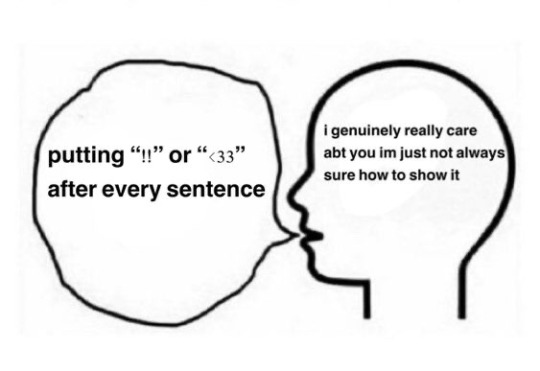
93K notes
·
View notes
Text
#tbr#booklr#tbr books#book tbr#book poll#kazuo ishiguro#grace curtis#sonoko machida#gretchen mcculloch
0 notes
Text
The linguist J. K. Chambers did a survey of Canadian twelve-year-olds in the 1970s, and found that two-thirds of them said “zee”—but when he went back and surveyed the same population in the 1990s, he found that the vast majority were now using “zed” as adults. The same shift happened with successive generations. Chambers figured that children learn “zee” from the alphabet song and American children’s television programs like Sesame Street, but when they get older, they learn that “zed” is associated with Canadian identity and switch. Indeed, noted Chambers, “zed” is one of the first things that American immigrants to Canada change about their speech, “because calling it ‘zee’ unfailingly draws comments from the people they are talking to.”
Because Internet, Gretchen McCulloch
15 notes
·
View notes
Text
does anyone know that quote about how dictionary writers are trying to define language like trying to define the line of the tide by putting nails in the sand. google is not helping me and i can’t remember who said it
#linguistics#lingblr#my gut says gretchen mcculloch but it might also have been an academic paper somewhere#mine
7 notes
·
View notes
Text
i cant read books published after 2012 anymore because tell me why this linguistics book im reading just brought up welcome to night vale
#YOURE A NONFICTION BOOK.... YOU SHOULDNT KNOW ABOUT CECIL PALMER....#its my fault though its a book on internet linguistics. by what a specific reference. gretchen mcculloch whats your take on the newest ep.
9 notes
·
View notes
Text
One of my favourite things about linguistics (actually: the thing that got me into linguistics in the first place) is the differences in register between internet generations when texting, I'm so used to Youth People (who I socialise with and am exposed to the content of mostly) getting emotions into text in the standard internet-approved ways that it's like whiplash seeing older people type, my aunt texts like she is being held at gunpoint and yet i know that each message is bursting with beauty and emotion which is not being explicitly expressed
#linguistics#i am paraphrasing “because internet” by gretchen mcculloch#which is a really good book everyone go read it#it has been a while since i read it but i was just thinking about it when i got a really pass ag text
4 notes
·
View notes
Text
been listening to a (very fascinating) nonfiction book for two days and my brain is clawing for some fun and whimsy
#the nf book is Because Internet by Gretchen McCulloch#and it is really cool to learn about linguistics and the way language changes and specifically how it's changed in the last 30 years#and how the shift in written language in particular is being documented in a way we haven't been able to achieve#like i love it! i do!#lots of things i never really considered but having them pointed out i See It#great time highly recommend!#my brain however needs a good time#so idk what im gonna listen to#ks has a book tag#ks talks
2 notes
·
View notes
Text
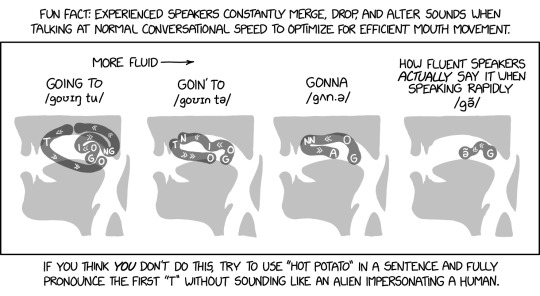
Thank you to linguist Gretchen McCulloch for teaching me about phonetic assimilation, and for teaching me that if you stand around in public reading texts from a linguist and murmuring example phrases to yourself, people will eventually ask if you're okay.
Fluid Speech [Explained]
Transcript
[Above the panel:] Fun fact: Experienced speakers constantly merge, drop, and alter sounds when talking at normal conversational speed to optimize for efficient mouth movement.
[The panel shows four labeled side profiles of a mouth with paths of sounds made in different parts of the mouth. There is a label "More fluid" with an arrow pointing to the right.
From left to right:] [Label:] Going to /ɡoʊɪŋ tu/ [Path:] (G O >> I >> NG >> >> ) ( >> T >> >> O)
[Label:] Goin' to /ɡoʊɪn tə/ [Path:] (G O >> I >> N)(T >> >> O)
[Label:] Gonna /ɡʌn.ə/ [Path:] (G O >> NN >> A)
[Label:] How fluent speakers actually say it when speaking rapidly /ɡə̃/ [Path:] (G >> >> ə̃)
[Below the panel:] If you think you don't do this, try to use "hot potato" in a sentence and fully pronounce the first "t" without sounding like an alien impersonating a human.
#xkcd#xkcd 2942#fluid speech#webcomics#linguistics#can you tell i've been having trouble getting back up on this pony
4K notes
·
View notes
Text
Despite my whole blog basically being dedicated to translating Utena at the moment, I don't watch a whole lot of anime. But I just finished Dandadan and I'm totally in love with it. However, every now and then I switched on the english subtitles to have a peek at what was going on in there and my god... it was so bad.
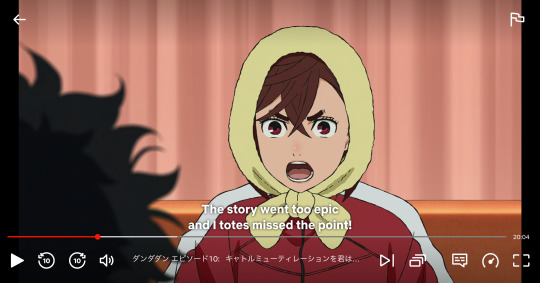
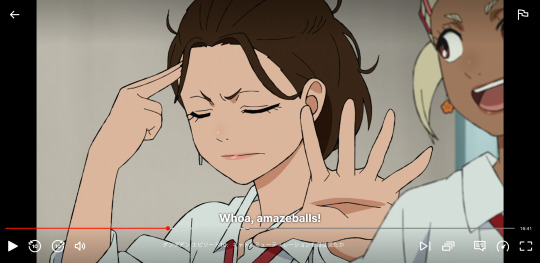
One of the first things I noticed about Dandadan's dialogue is that it really respects teenagers. Specifically teenage slang. As Gretchen McCulloch mentions in Because Internet, most language innovation comes from teenage girls (here's another source on that). They're often the ones pioneering changes in their language. Dandadan seems to very much respect this in the characters' extremely natural and realistic speech. This is how teens really talk to each other! And yet the translation takes this respect and spits on it with this how-do-you-do-fellow-kids 2012-era cringe inducing nightmare dialogue.
Also, Dandadan being MA15 (or whatever the equivalent rating is in your region) means that it could use lots of swear words... but the strongest word I've seen used in the subtitles is "crap". I'll rant about this another day but translations of Japanese media need to use the word "fuck" more. There's no equivalent word in Japanese, but a good translator should be able to tell when the vibe/grammar/tone would convey a fuck in english. Also, teenagers swear a LOT. If you want to convey a similar tone to the original japanese, you need to use swear words. It's just not optional.
Anyway all this to say, I'll probably start translating Dandadan after I'm finished with Utena. It sorely needs a translation that levels the same respect towards teenage girls and towards the sexual themes that the original script does.
68 notes
·
View notes
Text
2024 LingComm Grantees: New linguistics projects for you to follow
The 2024 LingComm Grants awarded six $500 (USD) grants, thanks to the support of Lingthusiasm, Rob Monarch, Wordnik, Claire Bowern, and Kirby Conrod and friends. Some of these projects are already producing content for you to enjoy right now!
LingComm Grants.
Emily Remirez, Linguistics Coloring Book
Adam Aleksic, Etymology Nerd videos
Sarah Wood, Pina Hare, Marcus Wilker, Get the Reference Podcast
Onyedikachi Augustine Okodo, English Parliament radio show
Irene Lami, Saussure e Grida podcast
Kirby Conrod LGBTQ+ LingComm Grant:
Montreal Benesch, trans*languaging art show
Commendations:
Talia Sherman, Tomayto Tomahto podcast
Franca Umasoye Igwe, Say No to Language Shaming Campaign
Marvin Nauendorff, Anthony Burger, Anna Sulaiman, Rebecca Hall, Alice Pol, Perla Camacho-Cedillo, Aline Vitaly, Yuka Kawasaki, Linguaphile Language Magazine
Grants were judged by Lauren Gawne and Gretchen McCulloch and also included a group mentoring meeting for advice and support. The 2024 LingComm Grants received 40 applications.
For more on the 2024 grants, the winners from previous years, and other lingcomm resources, check out the LingComm website.
214 notes
·
View notes